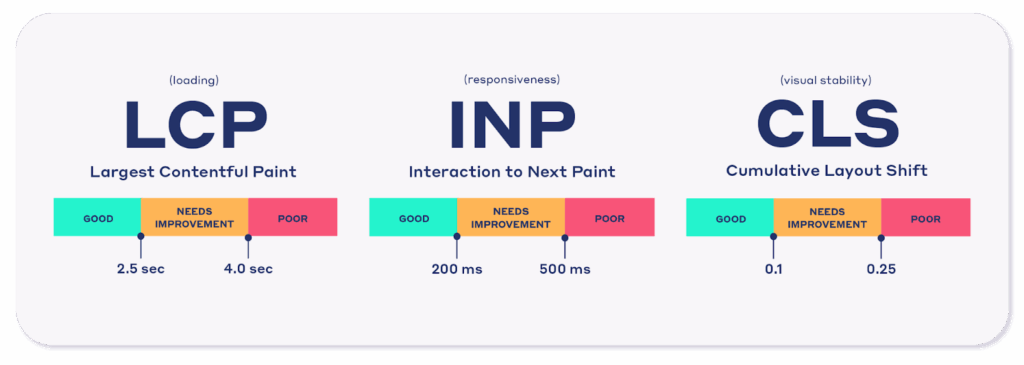Strong technical SEO is what keeps a site visible on Google and other search engines. A business can spend heavily on ads and content, but if pages load slowly, have crawl errors, or fail Core Web Vitals, rankings will still suffer.
Denver SEO can be especially challenging, with businesses facing competition from both local and national brands. If they want to stay in the running, their site must be fast, stable, and easy for search engines to read—this is what technical SEO is all about. This guide explains each area of technical SEO, and includes checklists you can use to spot any issues that might be stopping your site from performing as well as it should.
What Technical SEO Covers
Technical SEO is the structural side of search engine optimization. It includes site architecture, performance, and coding practices that help search engines index pages correctly. Without good technical SEO, a site is unlikely to achieve consistent visibility, no matter how great its content is.
You can think of SEO as having three core components: on-page SEO, off-page SEO, and technical SEO.
- On-site SEO: Content, keywords, headings, and layout.
- Off-site SEO: Links and mentions on other websites that build authority (also known as link-building SEO).
- Technical SEO: The foundation that supports both content and backlinks by keeping the site crawlable, fast, and reliable.
What Goes Into Technical SEO
Technical SEO can be broken down into four main areas:
- Website optimization: Clean code, compressed images, and efficient resource use.
- Indexing: Making sure search engines recognize and store all the right pages.
- Speed optimization: Faster load times and smooth user interaction.
- Mobile usability: Layouts and features that are reliable on any device.
If this is not done, search engines may not be able to fully access a site, and this can reduce its trust in your website.
Why Technical SEO Matters for Denver Businesses
The Denver market is highly competitive with small and medium-sized businesses vying for online visibility. They’re facing pressure not only from one another but large and national brands with larger marketing budgets and greater recognition. In this kind of market, technical SEO serves as an equalizer.
Customers in Denver are quick to pull out their phone to search for a product, service, or nearby business. If your site doesn’t work well on mobile or loads slowly, it’s very likely that potential customers will leave your site and go to a competitor. In fact, websites with a load time of one second have a conversion rate 2.5 to three times higher than those that load in five seconds.
Denver companies that invest in strong technical SEO can expect to see:
- Better rankings that push sites higher in local search.
- Stronger search performance when visitors spend more time on your pages and interact with what you publish.
- Reduced risk of losing traffic thanks to fixes that prevent broken links, crawl errors, and other site issues.
Core Web Vitals and User Experience
Core Web Vitals (CWV) are Google’s way of measuring how people experience a website—such as whether it loads quickly, responds to clicks/taps without delay, and is stable when loading. Having a good CWV score signals to Google that a site is reliable and provides a good user experience, ultimately meaning that the site will rank better.
The main Core Web Vitals are:
- Largest Contentful Paint (LCP): The time it takes for the largest element on the page, such as a hero image or heading, to load. A good score is under 2.5 seconds.
- Interaction to Next Paint (INP): How long it takes for the page to respond and show visible feedback after any click or tap. Google marks anything under 2 seconds in the good range.
- Cumulative Layout Shift (CLS): Tracks how much the layout moves around as the page loads. A low score means visitors won’t accidentally click the wrong button, something that can really frustrate users and lead to an increased bounce rate.
The chart below shows what Google considers “good”, “needs improvement”, and “poor” for each Core Web Vitals metric.

Google itself has stated just how important getting a “good” CWV score across the board is in its Page Experience guidance on Google Search Central:
Google’s core ranking systems look to reward content that provides a good page experience. Site owners seeking to be successful with our systems should not focus on only one or two aspects of page experience. Instead, check if you’re providing an overall great page experience across many aspects.
For Denver businesses, it means they can’t be complacent about any part of their Core Web Vitals score. There must be an ongoing effort to deliver a fast, stable, and reliable site that meets the expectations of local customers while satisfying Google’s ranking signals.
Core Web Vitals Denver checklist:
- Run page tests with Google PageSpeed Insights or Lighthouse to find performance problems.
- Look for oversized images, bulky scripts, or code that adds extra load time.
- Fix problems by compressing and resizing images, deferring non-critical scripts, and removing code that isn’t needed.
- Re-test after each change to track improvements.
Site Speed and Performance
Page speed impacts both rankings and lead acquisition. A slow site is frustrating to users and significantly increases bounce rates—53% of people will leave a site if it takes longer than three seconds to load. Since Google has made it clear that fast-loading pages are rewarded in search results, improving load speed is paramount to growing visibility.
Common causes of slow speed:
- Large, uncompressed images.
- Bloated or unminified code.
- Inefficient hosting setups.
- Too many plugins or third-party scripts.
Site speed Denver checklist:
- Compress and resize all images before upload.
- Turn on browser caching and use a trusted CDN.
- Minify CSS, HTML, and JavaScript files.
- Test performance regularly with tools like GTmetrix, Pingdom, or PageSpeed Insights.
More than 60% of searches in the US now happen on mobile, with the share even higher in metro areas like Denver. This is because people often search on the move—looking up restaurants, services, or shops nearby with quick “near me” queries when they’re ready to buy or book. If your site drags, people won’t wait—they’ll simply head to a competitor’s site instead.
This is why site speed and performance is so crucial—people don’t want to hang around for a site to load when they’re rushing between errands. Investing in speed optimization will also create a smoother experience for customers ready to convert.
Indexing and Crawlability
Indexing is what makes a site visible in search results. If Google or another search engine can’t access and store a page, customers simply won’t see it.
Common problems that interfere with indexing include:
- Duplicate content: Multiple pages with the same or very similar content weaken visibility.
- Broken links: Links that go nowhere waste crawl budget and are frustrating to users.
- Robots.txt errors: Blocking important resources by mistake can hide key parts of the site from search engines.
- Orphan pages: Pages with no internal links often go unnoticed and fail to rank.
Keeping on top of indexing should be part of regular SEO maintenance. Fixing these issues helps search engines read your site correctly and makes sure valuable pages show up when customers search.
An indexing and crawlability checklist should include:
- Run site audits to catch crawl errors.
- Submit updated XML sitemaps through Google Search Console.
- Strengthen internal linking so important pages are easy to find.
- Repair or redirect broken URLs.
This step is often not given the attention it deserves, despite being one of the most important steps of SEO. Denver businesses must make sure their site is properly indexed so that valuable pages show up in search for consumers that are ready to convert.
Mobile Usability and Accessibility
Most Denver consumers are using their cell phones to search. Since July 2024, Google has fully switched to mobile-first indexing, meaning the mobile version of your site is the primary version that Google evaluates—if it isn’t mobile-friendly, your visibility will be severely limited.
Common mobile usability issues:
- Non-responsive layouts that don’t adjust to different screens.
- Buttons and tap targets that are too small for touch navigation.
- Missing alt text on images, making content harder to understand for screen readers.
- Navigation menus that don’t work well on smaller screens.
Designing your site with accessibility in mind is also important. Clear navigation, readable text, and image descriptions makes for a better experience, whether customers have disabilities or are simply browsing in a hurry on a smaller screen.
Checklist for Denver businesses:
- Test mobile usability regularly in Google Search Console.
- Use responsive design and fluid layouts that adapt to any screen size.
- Add descriptive alt text for every image.
- Simplify navigation and make buttons large enough for touch.
Building a Long-Term Technical SEO Plan with Firestarter SEO
Technical SEO must be prioritized as an ongoing task. Sites change as new pages, products, and blog posts are added. Google’s algorithm is also updated frequently, meaning what worked last year may not work today. A long-term technical SEO strategy is crucial to avoid a slip in rankings.
Why a long-term plan matters:
- Google updates: Ranking signals shift often. Core Web Vitals, mobile usability, and crawlability are all areas Google has focused on recently.
- Growing websites: Every new page needs to be linked, indexed, and checked for speed. Otherwise, important content can go unseen.
- Changing user habits: Mobile and voice searches keep rising. People expect fast, responsive sites that work anywhere.
- Local competition: In Denver, new businesses launch all the time. Staying visible means keeping technical SEO tight, not just relying on content or ads.
What the work involves:
- Running regular site audits to spot errors and performance drops.
- Tracking Core Web Vitals to keep scores in the “good” range.
- Watching crawl reports in Google Search Console for indexing problems.
- Testing site speed with tools like PageSpeed Insights and GTmetrix.
- Making accessibility checks so pages work for all users.
- Updating code, structure, and schema markup as standards change.
Firestarter SEO’s role
Firestarter builds these tasks into a routine for our clients. We don’t just run a one-off audit and move on. We:
- Carry out in-depth technical reviews.
- Optimize for Core Web Vitals.
- Fix speed and performance issues.
- Resolve crawl and indexing errors.
- Add structured data to help Google understand site content.
- Provide clear reporting so clients see the results of the work.
Final Words
Search performance in Denver comes down to consistency. Regular audits, Core Web Vitals checks, and indexing fixes protect your marketing investment and keep your site in the running ranking-wise. Ignoring technical SEO leaves the door open for your competitors to gain the edge.
Firestarter SEO has years of experience helping businesses stay ahead with our technical SEO expertise. If you want to improve rankings, drive leads, and maintain a great digital presence, our team is ready to build a tailored technical SEO strategy. Contact us now to get started.


